The US State Department has approved a possible sale to Israel of up to eight KC-46 aircraft and related equipment for an estimated cost of $2.4 billion.
The Defense Security Cooperation Agency delivered the required certification notifying Congress of this possible sale today, this is displayed below.
“The Government of Israel has requested to buy up to eight (8) KC-46 aircraft; up to seventeen (17) PW4062 turbofan engines (16 installed, 1 spare); and up to eighteen (18) MAGR 2K-GPS SAASM receivers (16 installed, 2 spares). Also included are AN/ARC-210 U/VHF radios, APX-119 Identification Friend or Foe transponders, initial spares and repair parts, consumables, support equipment, technical data, engineering change proposals, publications, Field Service Representatives (FSRs), repair and return, depot maintenance, training and training equipment, contractor technical and logistics personnel services, U.S. Government and contractor representative support, Group A and B installation for subsystems, flight test and certification, other related elements of logistics support and training. The total estimated program cost is $2.4 billion.
The United States is committed to the security of Israel, and it is vital to U.S. national interests to assist Israel to develop and maintain a strong and ready self-defense capability. This proposed sale is consistent with those objectives.
The proposed sale further supports the foreign policy and national security of the United States by allowing Israel to provide a redundant capability to U.S. assets within the region, potentially freeing U.S. assets for use elsewhere during times of war. Aerial refueling and strategic airlift are consistently cited as significant shortfalls for our allies. In addition, the sale improves Israel’s national security posture as a key U.S. ally. Israel will have no difficulty absorbing this equipment into its armed forces. The proposed equipment and support will not alter the basic military balance in the region.”
The proposed sale comes despite delays in the programme. The main question is about the viability of its refueling function. The US Air Force has found significant problems with the KC-46’s remote vision system, essential in trying to line up and attach the refueling boom to the aircraft seeking to fill up its tanks.
The first KC-46 was delivered to the US Air Force a year ago and the service has ordered 179 of the planes. Israel is the second country to be approved for the KC-46 and Boeing is building two of the aircraft for Japan.



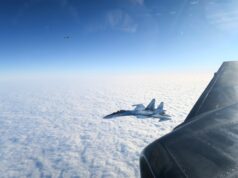
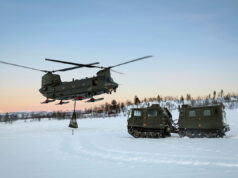


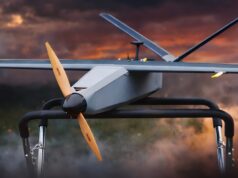
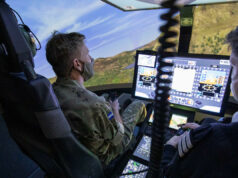
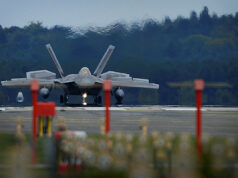
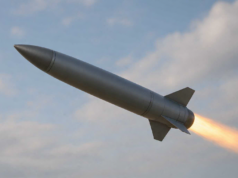



So even the worlds richest nation with most powerful military has problems with new equipment . Not just us then ,happens to everybody ?
Purchased with US funds no doubt.
The cost coming out of the military aid budget the US gives to Israel. So the US Government is essentially giving these crocks to the Israelis and simultaneously throwing a load of cash to Boeing for them.
Someone with a more suspicious mind might think it’s backdoor state aid to the troubled aerospace manufacturer…
Ssh you can’t say that about the champions of free trade , they would never engage in backdoor state aid !
You should look at the soft development loans boeing gets from us banks , some of them have interest rates of .25% and all underwritten by the federal government.
All of you who fantasize about Boeing going bankrupt and Airbus / BAE swooping in to take all of the lucrative contracts, are deluded. Boeing is way too big to fail.
No company is to big to fail . And Boeing has been close to bankruptcy several times.
It’s not that they are too big to fail, they are too important to be allowed to fail. There is also no-one out there that could buy them out & know what they are doing that even US regulators would accept.. LM could handle the military side I am sure, but due to mergers allowed by regulators who see 2 as all that is needed for competition, there is really no options. If Airbus buys Boeing, competition is dead.
By ” too big to fail”, I mean in the sense of the huge companies that were bailed out in the 2009 financial crisis. If they get into serious trouble, the government will intervene, just like in the case of GM (now known sardonically as “Government Motors”). The same would be done for BAE, Airbus or any number of precious “champions” in Europe. Like it or not, these industries are effectively insured at taxpayer expense.
Only because it’s continually propped up
There does not appear to have been a competitive process to select these planes! So I guess it is all political. I cannot help but remember that the Airbus tanker actually won the USAF tanker competition. But then Boeing complained and the contest was tailored so that they could win.
The US plane is much less capable then Voyager – so this is a perfect example of the best coming second to pander to US manufacturers and political lobby…
We should have stuck to the Airbus version… Boeing simply can’t seem to get its act together since the beancounters took over from the engineers…
Cheers
See above the Airbus plane won the USAF competition! But Boeing had the contest run again set up so they could win. The Airbus is by far the better plane – also it is now fully operational without the problems the Boeing plane has.
It is possible that Israelis use buddy system too.
The KC46 is a disaster. The USAF stated this week that they will not be using them for boom refueling in the forceeable future until the issues are fixed.
It did put a smile on my face when I read that
the USAF will have to “struggle on” with its current 400+ aircraft tanker fleet (400!!!!!). that is mostly based on converted 707s and DC10s and take a hit on the additional costs of keeping the aircraft airworthy.
THe KC46 is a classic case of pork barrel politics, a crap plane foisted on the USAF for political reasons- Israel is essentially getting them for free to prop up Boeing.
Essentially? The Israelis will almost certainly be buying these with money from the US governemt. Why would they spend their own cash when the Americans will buy it for them?
Why does the US use boom refuelling? It looks to me to be overly complex and potentially more dangerous.
Faster fuel transfer rates. Means you can fuel big jets efficeintly and small jets fast. I don’t think its that much more dangerous than probe refuelling.